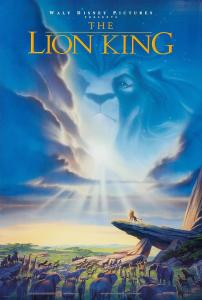Review of The Lion King, Directed by Roger Allers and Rob Minkoff
As my kids continue to grow up, my wife and I revisit our youths and indulge in a little nostalgia by popping in another Disney classic every few weeks. Then, I blog about them. I previously found Snow White lacking, Bambi interesting, and Beauty and the Beast weird. The Lion King (1994) stands head and shoulders above the rest. This is probably the best movie in the Disney opus (not counting Pixar).
The Lion King is the apogee of Disney’s mini-renaissance of the 1990s, a second golden age that also saw Aladdin and Beauty and the Beast (and The Little Mermaid, one of the worst movies ever made). Within that pantheon, The Lion King stands tall. The Lion King rightly deserves its spot at the 74th best movie of all time on IMDB.com’s list and its Golden Globe for Best Musical/Comedy. If there had been an Oscar for Best Animated Film back then, it would have won hands down. That Snow White is on AFI’s list of greatest movies rather than The Lion King is a travesty. Snow White is of historical value; The Lion King is actually a fun, watchable, profound film.
You almost certainly don’t need a plot synopsis because the story is familiar. An arrogant young prince flees home after mistakenly believing himself responsible for his father’s death, only to discover the courage and humility to return and challenge his wicked uncle for the throne. The film’s themes are archetypical: a father’s death, a son’s struggle for purpose and direction, our place in the cosmos, the meaning of leadership and sacrifice, etc. The film is Shakespearean. If you want a longer synopsis, you can find one here.
The film centers on the maturation of Simba, the young prince (voiced by Matthew Broderick). He first flees to escape his (perceived) guilt and responsibilities. In a crucial conversion scene, he is convicted of his negligence and chooses to return and face his fate. The conversion scene is brilliant. When Simba is confronted with his father’s ghost, he isn’t convicted of any specific wrongdoing. Instead, Mufasa (voiced by James Earl Jones) confronts Simba with the state of their relationship.
Adult Simba: Father?
Mufasa’s ghost: [appears among the stars] Simba, you have forgotten me.
Adult Simba: No. How could I?
Mufasa’s ghost: You have forgotten who you are and so have forgotten me. Look inside yourself, Simba. You are more than what you have become. You must take your place in the Circle of Life.
Adult Simba: How can I go back? I’m not who I used to be.
Mufasa’s Ghost: [Now fully formed in the sky] Remember who you are. You are my son and the one true king. Remember who you are.
Once you get over the strangeness of Darth Vader being Ferris Bueller’s dad, you realize that this is a resonant blend of Biblical truth and Platonic philosophy. Our identity is defined most truly by our relationship with the Heavenly Father (an image taken quite literally in The Lion King). We were made to be his sons and daughters, and when we act from that identity we act in accord with who we were made to be. Simba’s greatest failing is not that he fled, but that in doing so he failed his father and turned his back on who his father shaped him to be.
The Lion King, being mainstream entertainment and not a Christian sermon, cannot present the full gospel with the atonement and the resurrection. Instead, it presents sin as an act of forgetting, and salvation as achieved through an act of remembering, which is more Plato than Christ—but there is some overlap. Sin clouds the mind (Romans 1:21), and one of our chief means of sanctification is remembering what God has done for us in Christ. We are to “be transformed by the renewing your mind” (Romans 12:2). All in all, this is pretty deep stuff for seven lines of dialogue.
Sometimes that’s all it takes to push a story to the next level. A lesser film would catalyze Simba’s conversion by having him discover the death of a friend or family member, or witness the devastation caused by Scar’s disastrous rule. That would make Simba’s conversion based primarily on what he wants to achieve, or what he intends to fix. By focusing on Simba’s relationship with his father, his conversion is instead about who he is and his desire to honor his father.
That makes The Lion King is one of the most spiritually rich films we’ve reviewed on this site over the last year. But by infusing the story so heavily with spiritual themes, however, the storytellers run another risk. I think they fall prey to the confused Messiah-Hero Myth I wrote about in connection with Star Wars. It is impossible not to see in Simba some Messianic tropes. He is the son of the heavenly king and only he can return to save his people and restore the kingdom. So far, so messianic.
However, just as in other hero stories, there are dangers inherent in putting a messiah-figure in fiction. It can cause the viewer to want to be like the messiah-hero: if Simba inspires little boys in the audience, they will start to think of themselves as little saviors. Second, stories like this always tempt us to immanentize the eschaton, to usher in the Kingdom of God here and now on this earth. Third, for protagonists to be sympathetic to the audience, they must be human—which means they must be flawed and fallible like the rest of us. That teaches decidedly unbiblical lessons about the true Messiah.
I confess I am torn about stories like these. They can be powerful imaginative tools to help us emotionally connect with the storyline of the Bible. But precisely because they are partly true and emotionally powerful, they can also powerfully teach unhelpful and twisted versions of that storyline. Great art always carries with it great risk. It is surely better to have a world with such art in it, and The Lion King is up there with the best.












